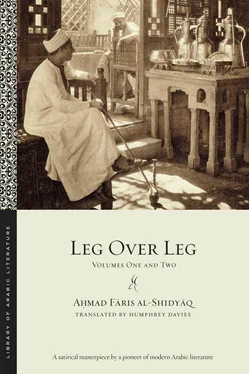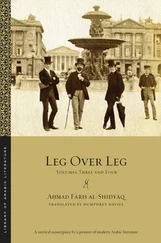2.14.3
I’d hoped to cite what he has to say, namely that the noun nikāḥ 539remains in use until now and occurs in books of jurisprudence innumerable times, which is an argument against those Christians who deny this and anyone who throws up his hands in horror when it’s employed. Scholars of religion used it without embarrassment for several reasons. The first is that it was used anciently in the Days of Barbarism and that same usage was then confirmed in the Era of Rationality. The second is that it occurs in the Qurʾan. The third is that it is composed of four letters and thus accords with the humors, the elements, and the directions. The fourth is that the letters of which it is composed occur among the “mysterious letters” 540of the chapters of the Qurʾan; thus the nūn occurs in “ Nūn . By the Pen and what they inscribe,” 541the kāf in kāf-hāʾ-yāʾ-ṣād , 542the alif in alif-lām-fāʾ , 543and the ḥ in ḥāʾ-mīm . 544The fifth is that if you write the word backward, you will find two noble meanings, the first being an active participle of the verb ḥ-y-y , the second an imperative verb formed from kāna ; 545thus God’s creation is revealed , the essential truths made manifest to those whose eyes can pierce the veil to arrive at what’s concealed . The sixth is the lightness of the word on the tongue and its sweetness to the taste. The seventh is that its beginning signifies its end and its end its beginning, this kind of word play being called by some “the signifying of the end by the beginning and vice versa.” The advantage this bestows lies in the fact that, if a judge calls on someone to bear witness against the commissioner of such an act and the witness utters the letter nūn followed by the letter kāf 546and then swoons, or the judge swoons, from lasciviousness, those left standing in the judge’s chambers will understand what the speaker was trying to say. Similarly, should he be overcome in the course of his testimony by such longing and dread that he can no longer speak and all that can be heard from him is the alif and the ḥāʾ , 547this last part of the word, though consisting of only a small number of letters, will provide all the signification that could be asked for.
2.14.4
I declare, “This analysis is indeed elegant. It is not, however, to be found in the books of the rhetoricians and the stylists. Personally, I’m not fond of long words, so the best thing would be to create a new, shorter, one from that assemblage of letters by keeping only the end. 548If it be said, ‘But you used very long words when you described a bonnet as being mustaqbiḥah and mustafẓiʿah 549even though you could just as well have described it with short words,’ I reply, ‘That falls under the rubric of “maintenance of consistency,” for it is required by the height of the bonnet, whereas what is signified by the word in question doesn’t take long.’”
2.14.5
I started to say something at the beginning of this chapter and didn’t finish it, the pen, as usual, having drawn me unawares into another topic, and I doubt that Your Elevated Honor or Sublime Presence understood it. I now therefore declare: “If the ideal of marriage be that each of the two spouses take his companion for his own sake and not for that of his countrymen, acquaintances, or friends, the way that ʿUlayyān ate Umm ʿAlī’s chicken’s thigh, 550it would be unreasonable for someone wearing a bonnet to intrude upon them and tell the woman, ‘Don’t marry so-and-so because he wasn’t given the name Buṭrus’ and then to the man, ‘Don’t marry so-and-so because she wasn’t given the name Maryam’ or ‘Today’s Sunday, and marriage is not allowed’ or ‘This room isn’t licensed for the contraction of marriages.’ Nor would it be proper for him to say to them, ‘I want to see the kohl-stick stuck in the pot.’ Such things, I swear, are not fit to be spoken or written of by any.
2.14.6
“Then again, the woman is one of those things that, like the sun or the moon, are so much looked at that the mind doesn’t pay them the attention they deserve. This may be demonstrated by the fact that God, Mighty and Powerful, created woman from man to be a helpmeet to him in his daily affairs and a comfort to him in the midst of his anguish and cares . It seems to us, though, that this underlying intention is so frequently distorted that man’s calamities, care, loneliness, ill fortune, wretchedness, and deprivation, nay even his perdition, come from woman, thus turning that collaboration into a cause of aggravation . In brief, one is born into this world in need of many things required for one’s survival (such as food, drink, sleep, and warmth) and others that are not but that exist rather to rectify one’s nature so that it does not become imbalanced (such as laughter, speech, recreation, listening to songs, and having women). This last, however, while originally created for the rectification of nature (as evidenced by the fact that a man can live for a while without it), has gained the upper hand over all other mundane requirements of life which cannot be foregone. Observe that a man who dreams of a woman gets from her in his dream what he would have had were he awake, while this is not true of one who dreams of eating honey or drinking the best wine, which is anyway something that very rarely happens, even to one who is hungry or thirsty. How often have our friends the poets been content to see the image of the beloved in their dreams! None, however, was ever content to have the object of his eulogies send him a glass of wine or a pot of porridge in a dream. Likewise, if a person partakes of some tasty food, be it of one kind or two, he will remain satisfied with what he’s eaten for a number of hours and give no thought to the cooking pot and its potential contents. Then, when revisited by hunger, he will start thinking again of having another meal. Never, however, has it been heard that one in a state of hunger or thirst, on seeing a bird, would wish for it to fall onto the spit in his house so that he could gulp it down or keep ogling the cooks’, grocers’, and oil chandlers’ shops or peering through their keyholes, the chinks in their doors, or the cracks in their walls at the different kinds of food inside.
2.14.7
“True, in our country ‘the hungry man thinks that everything round is a loaf,’ as the saying goes, and it may be that in some Frankish countries, where they have so many different kinds of food, they harbor similar thoughts about everything round, oblong, or cloven like a sheep’s hoof, but one who is hungry for women has no one shape to fix on. The same goes for drink, for a thirsty man, having once quenched his longing with water, will feel aversion to drinking more, even if a glass filled with the nectar of paradise is brought him. Similarly, one who is cold and needs warmth, once he has put on some clothes to warm himself and cut himself a fine figure in public, will not thereafter stand on tiptoes to peer at every garment he sees displayed for sale in the merchants’ stores. Were he to see, for example, a rainbow or a meadow brocaded with gay flowers, he wouldn’t want the same colors to be on his drawers or his shirt; he would see it and simply find it beautiful without exercising his mind and heart over it or dreaming that same night of an elegant garden or imagining as he lay on his bed that, if it were next to his pillow, he’d feel more comfortable or live longer. The same goes for the sleeper: if he gets enough sleep on his hard bed, the subsequent sight of a luxuriously comfortable bed will be of no interest to him. In sum, everyone has a brain in his cranium that guides him to what will benefit him and what will hurt him and to what will do him harm and what will bring him pleasure, and, in both his stomach and his gullet, there is an accurate set of scales that measures what food and drink he needs and that enables him to grasp the meaning of the saying, ‘One meal precludes many another.’
Читать дальше












